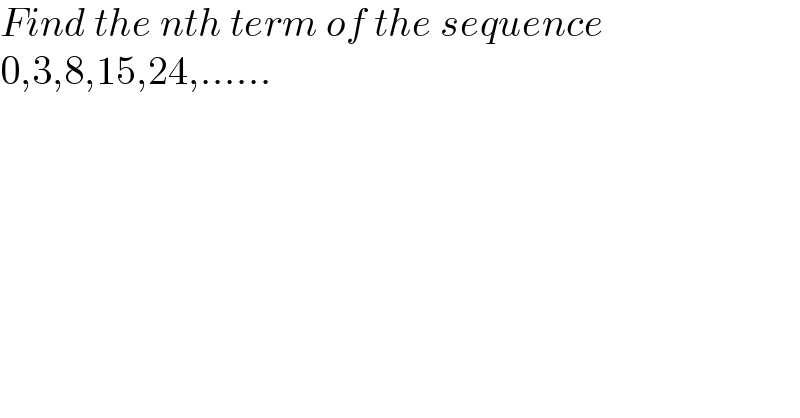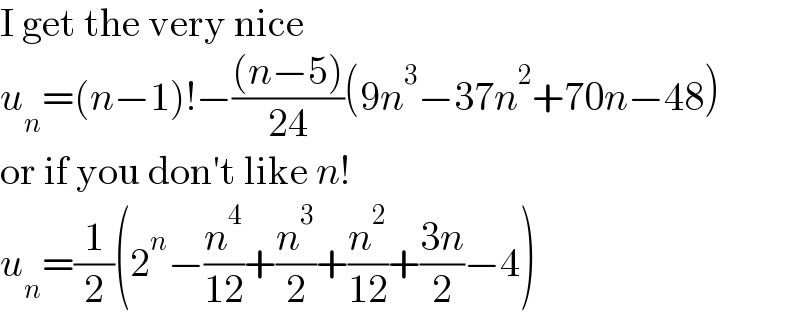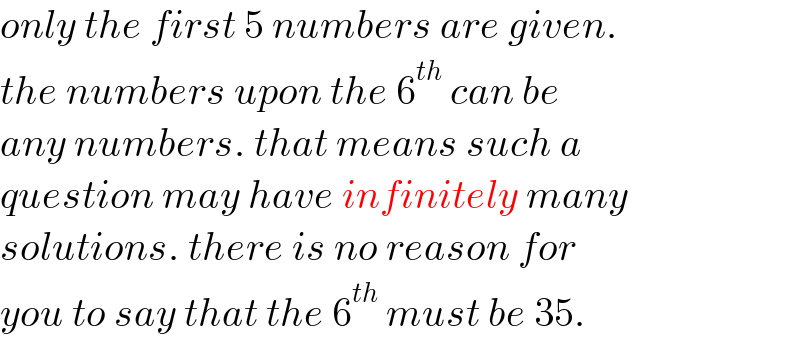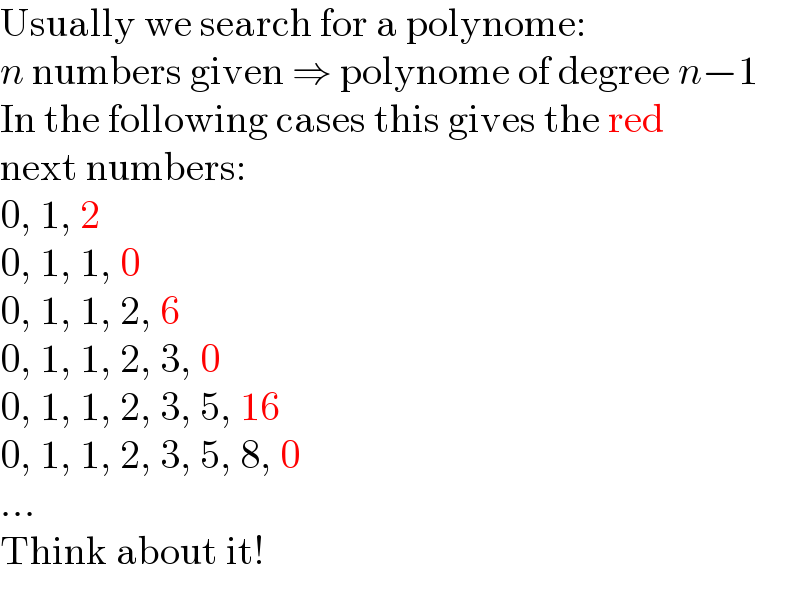
Question Number 206532 by necx122 last updated on 17/Apr/24

$${Find}\:{the}\:{nth}\:{term}\:{of}\:{the}\:{sequence} \\ $$$$\mathrm{0},\mathrm{3},\mathrm{8},\mathrm{15},\mathrm{24},...... \\ $$
Answered by Berbere last updated on 17/Apr/24

$${Impossibl} \\ $$$${there}\:{are}\left[{infinity}\:{way}\:\right. \\ $$$${n}^{\mathrm{2}} −\mathrm{1};{n}\in{Z}_{+} \:{one}\:{of}\:{them} \\ $$
Answered by BaliramKumar last updated on 18/Apr/24
![0 _(+3) 3 _(+5) 8 _(+7) 15 _(+9) 24 ......... a = 3 d = 5 − 3 = 2 S_(n−1) = ((n − 1)/2)[2×3 +(n −1−1)×2] S_(n−1) = (n−1)[3 +(n −1−1)] S_(n−1) = (n−1)(n +1) = n^2 − 1 U_1 + S_(n−1) = U_n = 0 + n^2 − 1 U_n = n^2 − 1](Q206534.png)
$$\mathrm{0}\underset{+\mathrm{3}} {\underbrace{\:\:\:\:\:\:}}\mathrm{3}\underset{+\mathrm{5}} {\underbrace{\:\:\:\:\:\:\:\:}}\mathrm{8}\underset{+\mathrm{7}} {\underbrace{\:\:\:\:\:\:\:\:}}\mathrm{15}\underset{+\mathrm{9}} {\underbrace{\:\:\:\:\:\:\:\:\:\:}}\mathrm{24}\:\:\:\:\:......... \\ $$$$\:\:\:{a}\:=\:\mathrm{3}\:\:\:\:\:\:\:\:\:{d}\:=\:\mathrm{5}\:−\:\mathrm{3}\:=\:\mathrm{2} \\ $$$$\mathrm{S}_{\mathrm{n}−\mathrm{1}} \:=\:\frac{\mathrm{n}\:−\:\mathrm{1}}{\mathrm{2}}\left[\mathrm{2}×\mathrm{3}\:+\left(\mathrm{n}\:−\mathrm{1}−\mathrm{1}\right)×\mathrm{2}\right] \\ $$$$\mathrm{S}_{\mathrm{n}−\mathrm{1}} \:=\:\left(\mathrm{n}−\mathrm{1}\right)\left[\mathrm{3}\:+\left(\mathrm{n}\:−\mathrm{1}−\mathrm{1}\right)\right] \\ $$$$\mathrm{S}_{\mathrm{n}−\mathrm{1}} \:=\:\left(\mathrm{n}−\mathrm{1}\right)\left(\mathrm{n}\:+\mathrm{1}\right)\:=\:\mathrm{n}^{\mathrm{2}} \:−\:\mathrm{1} \\ $$$$\mathrm{U}_{\mathrm{1}} \:+\:\mathrm{S}_{\mathrm{n}−\mathrm{1}} \:=\:\mathrm{U}_{\mathrm{n}} \:=\:\:\mathrm{0}\:+\:\mathrm{n}^{\mathrm{2}} −\:\mathrm{1} \\ $$$$\:\mathrm{U}_{\mathrm{n}} \:=\:\mathrm{n}^{\mathrm{2}} −\:\mathrm{1} \\ $$
Commented by necx122 last updated on 18/Apr/24

$${wow}!\:{Thid}\:{is}\:{so}\:{clear}.\:{Thank}\:{you}. \\ $$
Answered by Frix last updated on 17/Apr/24

$$\mathrm{I}\:\mathrm{get}\:\mathrm{the}\:\mathrm{very}\:\mathrm{nice} \\ $$$${u}_{{n}} =\left({n}−\mathrm{1}\right)!−\frac{\left({n}−\mathrm{5}\right)}{\mathrm{24}}\left(\mathrm{9}{n}^{\mathrm{3}} −\mathrm{37}{n}^{\mathrm{2}} +\mathrm{70}{n}−\mathrm{48}\right) \\ $$$$\mathrm{or}\:\mathrm{if}\:\mathrm{you}\:\mathrm{don}'\mathrm{t}\:\mathrm{like}\:{n}! \\ $$$${u}_{{n}} =\frac{\mathrm{1}}{\mathrm{2}}\left(\mathrm{2}^{{n}} −\frac{{n}^{\mathrm{4}} }{\mathrm{12}}+\frac{{n}^{\mathrm{3}} }{\mathrm{2}}+\frac{{n}^{\mathrm{2}} }{\mathrm{12}}+\frac{\mathrm{3}{n}}{\mathrm{2}}−\mathrm{4}\right) \\ $$
Commented by BaliramKumar last updated on 18/Apr/24

$$\mathrm{how}\:\mathrm{to}\:\mathrm{find}? \\ $$
Commented by Frix last updated on 18/Apr/24

$$\mathrm{Just}\:\mathrm{be}\:\mathrm{creative}. \\ $$
Commented by BaliramKumar last updated on 19/Apr/24

$$\mathrm{not}\:\mathrm{true}\:\mathrm{for}\:\:\:\:\mathrm{n}\:\geq\:\mathrm{6} \\ $$
Commented by mr W last updated on 19/Apr/24

$${only}\:{the}\:{first}\:\mathrm{5}\:{numbers}\:{are}\:{given}. \\ $$$${the}\:{numbers}\:{upon}\:{the}\:\mathrm{6}^{{th}} \:{can}\:{be} \\ $$$${any}\:{numbers}.\:{that}\:{means}\:{such}\:{a} \\ $$$${question}\:{may}\:{have}\:{infinitely}\:{many} \\ $$$${solutions}.\:{there}\:{is}\:{no}\:{reason}\:{for} \\ $$$${you}\:{to}\:{say}\:{that}\:{the}\:\mathrm{6}^{{th}} \:{must}\:{be}\:\mathrm{35}. \\ $$
Commented by Frix last updated on 19/Apr/24

$$\mathrm{Usually}\:\mathrm{we}\:\mathrm{search}\:\mathrm{for}\:\mathrm{a}\:\mathrm{polynome}: \\ $$$${n}\:\mathrm{numbers}\:\mathrm{given}\:\Rightarrow\:\mathrm{polynome}\:\mathrm{of}\:\mathrm{degree}\:{n}−\mathrm{1} \\ $$$$\mathrm{In}\:\mathrm{the}\:\mathrm{following}\:\mathrm{cases}\:\mathrm{this}\:\mathrm{gives}\:\mathrm{the}\:\mathrm{red}\: \\ $$$$\mathrm{next}\:\mathrm{numbers}: \\ $$$$\mathrm{0},\:\mathrm{1},\:\mathrm{2} \\ $$$$\mathrm{0},\:\mathrm{1},\:\mathrm{1},\:\mathrm{0} \\ $$$$\mathrm{0},\:\mathrm{1},\:\mathrm{1},\:\mathrm{2},\:\mathrm{6} \\ $$$$\mathrm{0},\:\mathrm{1},\:\mathrm{1},\:\mathrm{2},\:\mathrm{3},\:\mathrm{0} \\ $$$$\mathrm{0},\:\mathrm{1},\:\mathrm{1},\:\mathrm{2},\:\mathrm{3},\:\mathrm{5},\:\mathrm{16} \\ $$$$\mathrm{0},\:\mathrm{1},\:\mathrm{1},\:\mathrm{2},\:\mathrm{3},\:\mathrm{5},\:\mathrm{8},\:\mathrm{0} \\ $$$$... \\ $$$$\mathrm{Think}\:\mathrm{about}\:\mathrm{it}! \\ $$
